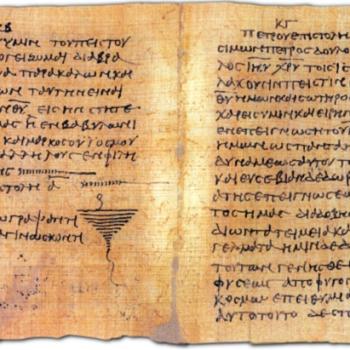If anyone thinks the ancient world was a backward, ignorant age, and that no one back then could see the world through our “modern” point of view, the ancient Epicureans are proof to the contrary. The Epicureans were a school of thinkers in New Testament times who were just as liberal or “modern” in their views as anyone today. Followers of Jesus were not ignorant of such views; they simply rejected those views. And the rabbis agreed with followers of Jesus in their opposition to Epicurean teaching.

The Epicureans had a fairly modern view of science. They understood that the earth was not the center of the universe (Lucretius, De Rerum Natura 1.1070-71). Lucretius speculated that there were even other earths with life on them (2.1056-66). The Epicureans believed that the universe is made up of nothing but space and atoms in motion (Lucretius 1.418-21), and that empty space extends without limit in all directions (1.958-64). They understood that the stars were not gods, but masses of fire (5:523-25).
The Epicureans believed that the earth was formed, not by any god, but by a chance meeting of atoms (5.416-31). Says Lucretius: “Nothing can ever be created by divine power out of nothing” (1.152). Directly contradicting Genesis, Lucretius predates Darwin by 1900 years when he declares, “The earth…itself created the race of humans and animals” (5.822-23). He goes on to give his account of survival of the fittest.
According to Lucretius, everything in the universe can be explained by mechanical causation, and so there is no need for divine intervention: “Nature is free and uncontrolled by proud masters and runs the universe by itself without the aid of gods” (2.1090-92). The Epicureans rejected supernatural phenomena such as prophecy, miracles, angels, or demons. They taught that the gods are not behind natural phenomena such as storms, eclipses, or meteors.
Epicurus believed that the gods dwell far away and do not get involved in earthly affairs. He believed that the gods are incapable of anger or favor (his first authorized doctrine), and are therefore indifferent to wickedness. His followers also redefined the concept of hell, much as modern thinkers have done. Says Lucretius, “As for the terrors that are said to take place in the depths of hell, they are actually present here and now, in our own lives.” (3.978)
Lucretius declares that before Epicurus, humans lay crushed “under religion” (sub religione, 1:62-63). He depicts the human race projecting all sorts of misconceptions onto the gods and saddling themselves with misery through fear of death and fear of punishment (5:1161-1240). Epicurus (Menoeceus 124) declares that the popular beliefs that the gods reward the good and punish the wicked are “false suppositions.”
Finally, the Epicureans were firm in their denial of life after death. They viewed death as simply extinction, an end of sensation that is not to be feared. As Epicurus insists, “death is nothing to us. For all good and evil consist in sensation, but death is deprivation of sensation… For there is nothing terrible in life, for the one who has genuinely comprehended that there is nothing terrible in not living.” (Menoeceus 125).
All this sounds amazingly modern. It is no surprise that the Epicureans were the arch-enemies of Biblical faith. The Mishnah teaches that Jews must master the Torah “so as to refute the Epicurean” (Aboth 2:14). The hated ruler Antiochus Epiphanes (who defiled the Temple in the days of the Maccabees) was an Epicurean, and it was believed that the future Antichrist would be one, too.
Epicureans were the scoffers who asked, “Where is the promise of His coming?” (2 Peter 3:4) They are the ones who mocked at the end of Paul’s speech at Athens when he spoke of Someone rising from the dead (Acts 17:32). It was Epicureans whom Paul describes as “enemies of the cross of Christ,” saying, “Their end is destruction, their god is the belly, and they glory in their shame, with minds set on earthly things.” (Philippians 3:18-19) He says they are enslaved to the “weak and beggarly elements,” to mere specks of matter (Galatians 4:9).
The writers of the Bible were not the only ones to criticize the Epicureans. The Stoic philosopher Epictetus also strongly objected to their teachings. Epictetus writes, If the pleasure of the flesh is good, “a man acts foolishly if he abstains from what belongs to others, when he is a judge and is able to take it… For Epicurus himself does not even declaring stealing to be bad, but he admits that detection is…” If you can steal in secret, he asks, and you have powerful friends in Rome, why refrain from what is good? How can you teach what is bad, but practice what is good? Be consistent! He asks, “Why should we not corrupt our neighbor’s wife, if we can do it without detection?” (See Epictetus’ Discourses 3.7.11-16.)
The Epicureans forbade marriage and procreation. Epictetus asks, “Where will citizens come from? Who will bring them up? …Come, take a young man, bring him up according to your principles. The doctrines are bad, subversive of a state, pernicious to families, and not becoming to women. Get rid of them.” (Discourses 3.7.19-21)
Epictetus asks, “Why do you rise early and write so many books, so that no one may be deceived about the gods and believe that they take care of men, or that no one may suppose the nature of good to be other than pleasure? For if this is so, lie down and sleep, and lead the life of a worm, of which you have judged yourself worthy. Eat and drink, and enjoy women, and ease yourself, and snore.” (Discourses 2.20.10)
Today’s ideological liberalism was alive and active in the New Testament world, in the teaching of the Epicureans. The New Testament writers were not ignorant of such views; they simply rejected them. And so should we.















